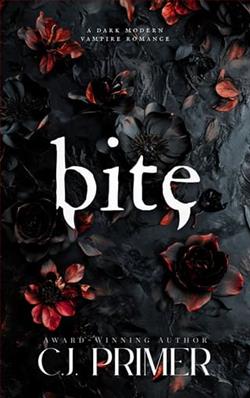Page 107 of Nine Months to Bear
“Yeah.” She sighs sadly, cheek pressed to the glass so that her exhale fogs the pane. “Pathetic, isn’t it? A thirty-year-old woman still trying to win Mommy’s approval with pretty flowers.”
“What happened to her smile?”
Olivia’s reflection in the window looks fragile, breakable. “She found out I was stealing them. So she marched me back to school, made me confess to the principal, and wrote a check for damages.” Her voice drops to a whisper. “She told me that thieves never succeed in life. That disappointment was becoming a pattern with me.”
Rage builds in my chest, hot and violent. I want to find Margaret Aster and explain to her exactly what happens to people who crush children’s spirits for sport.
“Jesus Christ.”
“The irony is that orchids became my good luck charm. Like they’ll somehow make me worthy of success.” She turns to face me. “Again, you don’t have to say I’m pathetic; I already know.”
“I wasn’t going to say that.” I stand and move to join her at the window. “You want to know what’s pathetic? Recognizing my mother’s perfume on my uncle’s collar… on the day of my father’s funeral.”
Olivia’s eyes widen. “My God, Stefan?—”
“They were fucking. Had been for months before my father died, maybe longer. They planned his death together.” I haven’t said this out loud in years; it’s funny how easily it comes out now. Utterly emotionless, really. “I knew, and I did nothing. For two years after we buried him, I sat at family dinners and pretended not to know that the woman who raised me and the man who took me shooting on weekends had murdered the only person who ever gave a damn about me.”
She shudders. “What did you do?”
“I learned. I watched. I planned.” I turn to face her. “And when I was eighteen, I destroyed them both.”
“How?”
“I exposed their affair to the family council, provided evidence of their embezzlement, and made sure every rival organization knew exactly how vulnerable they’d become.” I meet her gaze. “My uncle took his own life. My mother… Well, I wasn’t going to leave it to chance. I did the taking for her.”
Olivia stares at me for a long moment. I wait for the revulsion, the fear, the inevitable retreat that comes when people see me clearly.
It doesn’t come, though.
Instead, she reaches out and touches my arm. Her fingers are warm against my skin. “I’m sorry you had to go through that.”
I cringe away. “Don’t.”
“Don’t what?”
“Don’t look at me like I’m some wounded animal that needs rescuing.”
“I’m not.” Her hand doesn’t move. “I’m looking at you like someone who understands what it means to have the people who should protect you be the ones who hurt you most.”
Her hand is still on my arm. Warm. Too steady. I should pull away, but I don’t.
She blinks fast, once, twice. Her fingers flex against my sleeve, as if she’s deciding whether to let go.
“You know what that’s like,” I say. “Don’t you?”
She bobs her head, not answering. A small crease forms between her brows.
“Not family,” I add. “But someone. Someone you trusted.”
Her lips part, then press shut again. She looks at the floor, at the teak under her bare feet, anywhere but me.
“Your mentor,” I push. “Walsh. She burned you.”
That does it. Her shoulders tense up, sharp under the thin straps of her dress. She breathes out through her nose, a short, angry sound.
“Rebecca Walsh,” she whispers. The name comes past her lips utterly broken, like shards of glass catching in her throat. “She was my attending when I was a resident. Everyone worshiped her. Brilliant, polished, the doctor you wanted to be. Or at least, I wanted to be her. And she let me. Took me under her wing. Drinks after shift, late nights in the lab. I thought?—”
She cuts herself off, shakes her head. “I thought she was my friend.”















